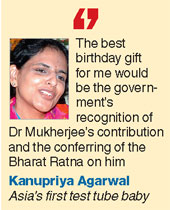
SSKM Hospital will be the first government-run health care unit in Bengal to offer infertility treatment.
The in vitro fertilisation (IVF) clinic will come up at the hospital's gynaecology building by the end of this year.
Fertility expert Gautam Khastgir said doctors and technicians from his clinic -Bengal Infertility and Reproductive Therapy Hospital (BIRTH) - would run the clinic, along with doctors and paramedics of SSKM.
"The set-up is almost ready. We should be able to start operations within the next two to three months," he said. "I and 15 of my team members, including embryologists, sonologists, lab technicians and nurses, would work three days a week at SSKM and three days at our clinic."
Khastgir was speaking at a seminar organised by the Bengal chapter of the Indian Society for Assisted Reproduction (ISAR) on Sunday.
The state director of medical education, Sushanta Banerjee, said the services at the SSKM clinic would be free in keeping with the chief minister's promise of free treatment at state-run hospitals.
The cost of a single cycle of IVF varies between Rs 1 lakh and Rs 1.3 lakh at various private fertility clinics in the city. Since the success rate of live births is only 30 to 40 per cent, more cycles are needed.
"Cost is the main reason why many people cannot afford IVF. If one can afford six cycles of IVF, the success rate will go up to 80 or 90 per cent. But the cost also goes up to Rs 4 lakh. Now, more people will be able to get IVF treatment," Khastgir said.
According to estimates, a little less than 10 per cent of all married couples suffer from infertility. While most of them get results through medicines or artificial insemination of sperm into the uterus, about five per cent of such couples need IVF.
IVF is the process of fertilisation by manually combining an egg and a sperm in a laboratory dish and then transferring the embryo to the uterus.
At Sunday's seminar on the present status of artificial reproductive technology, IVF specialists from across the country made a pitch for Subhash Mukherjee, who had discovered modern techniques of in vitro fertilisation and produced the world's second test tube baby in Calcutta, to be awarded the Bharat Ratna posthumously.
Some of Mukherjee's achievements include the usage of human menopausal gonadotropins (HMG) for ovarian stimulation in IVF. He was the first to use a trans-vaginal approach for ovum pick-up, the first to cryopreserve human embryos and the first to transfer an embryo in a subsequent untreated cycle - techniques that are still in vogue.
"Subhash Mukherjee was much ahead of his times but never got recognition for his achievements," said Hrishikesh D. Pai, the president of ISAR. "Now, we want both the state and central governments to honour him. Our demand is that the Centre declare October 3 - the day when the first test tube baby in Asia was born in Calcutta in 1978 - as national fertility day."
The test tube baby, Kanupriya Agarwal (Mukherjee had named her Durga), now 37 and settled in Mumbai, was present at the seminar. A cake was cut to celebrate her birthday a day after the actual day.
"The best birthday gift for me would be the government's recognition of Dr Mukherjee's contribution and the conferring of the Bharat Ratna on him," said the former student of La Martiniere for Girls and Sri Shikshayatan College. She now works for a telecom major in Mumbai.











